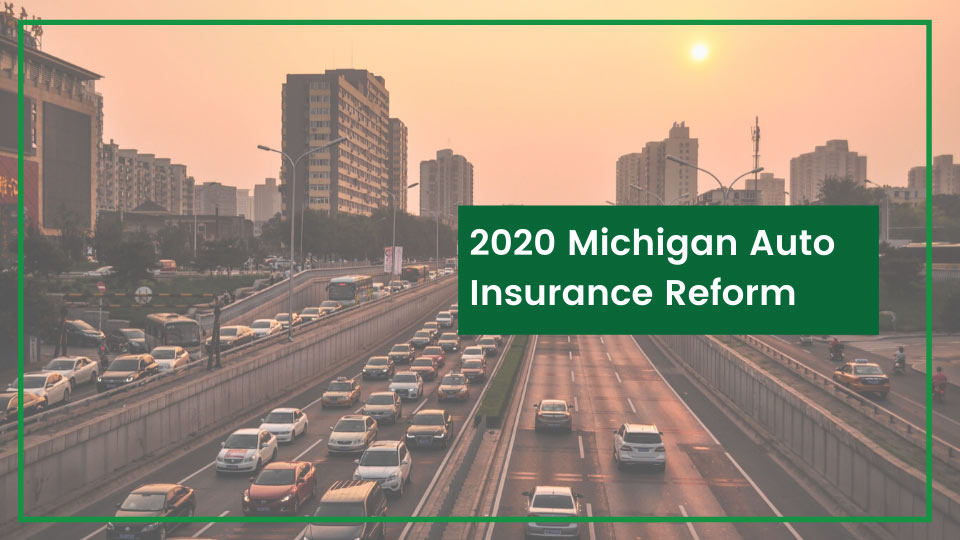In Michigan auto insurance can be a pain point for many Michigan drivers, especially in certain zip codes where rates have been rapidly rising over the last few years. As policy prices have continued to rise, the number of drivers without auto insurance has risen with it. This has put even more stress on the court systems that are working through auto accident claims.
For this reason, last year a new historic bipartisan auto no-fault legislation was passed to help lower auto insurance costs, maintain coverage options and improve auto policy holder protections. Ultimately, the reform is intended to make owning auto insurance more affordable.
There was a lot of talk about this last summer, but with the reform scheduled to apply to policies issued or renewed after July 1, 2020, many drivers need to get prepared for what’s to come. Here’s a breakdown of how the no-fault reform will impact your auto insurance costs.
Personal Injury Protection (PIP): PIP medical coverage offers auto insurance policy holders coverage for medical, recovery, rehabilitation and in some cases funeral expenses if a policyholder is involved in an auto accident. The new coverage limits will meet or exceed the highest benefits in the country while also allow driver the option to choose coverage options that fit their need/budget.
Premiums: Every insurance policy provider will now be required to reduce average PIP medical premiums for the next eight years. Starting July 1, 2020, insurance agencies will need to reduce premiums from 10%-45% or more depending on the PIP option selected by the auto policyholder.
Fee Schedule: In order to control the costs that medical providers charge auto insurance companies while maintaining policy coverage, the reform will set a fee schedule that makes the payout of these charges much more manageable for auto insurance companies.
Michigan Catastrophic Claims Association (MCCA) Assessment: Today, if an auto accident should result in medical costs exceeding $580,000, the MCCA reimburses auto insurance member companies for these PIP medical costs. The reform will result in a lowering of per vehicle assessments starting July 2, 2020, saving drivers at least $120 per car and those with unlimited PIP medical coverage will not pay any assessment to the MCCA.
To put it simply, given the rapid rise in auto insurance costs, the no-fault reform seeks to offer relief to policy holders while also making auto insurance more affordable for the uninsured. It isn’t a simple undertaking, but the idea is to make life better for drivers, insurance companies and the court systems that process auto claims.
Date to Remember: July 1, 2020
If your auto policy is up for renewal on or after July 1, 2020, you should speak with your insurance agent to understand your options. Ideally, your insurance provider will be tracking the developments of the reform and determining what will be the best option for you. It is critical to have a proactive insurance agent working on your policy to make sure you are getting the best coverage for you at the lowest rate possible.
Tips for Navigating Auto Insurance Reform
- All existing auto policy holders should revise existing policies after the law takes effect on July 1, 2020.
- Make sure you are working with a proactive insurance agent that will help you take advantage of any possible cost savings and coverage benefits as a result of the reform.
- Understand that there will be some immediate benefits to your policy options and rates, but some of the benefits might not be realized until 2021.
- Be proactive and learn everything you can about the reform. The more informed you are, the better you will be able to find the best coverage at the lowest rate.
- Ask your insurance provider questions now so you can get ready for what’s to come.
- Use this as a time to shop rates to see if there are opportunities to improve coverage and save.
- Work with a proactive insurance agency that is focused on adding value to your insurance experience.
History of Michigan’s No-Fault Auto Insurance Law
Michigan’s no-fault auto insurance system was passed in 1973 and has consistently been a point of contention for many. However, the program was developed to make claims a much simpler process for victims of auto accidents, especially when multiple drivers were involved. In addition, the program was set up to:
- Minimize the number of necessary lawsuits to limit the burden placed on Michigan’s courts
- Deliver benefits to injured persons in auto accidents quickly
- Offer victims compensation for income loss and medical expenses
While the no-fault law is intended to help victims in accidents and minimize the amount of cases that go to court, rising auto insurance costs in Michigan have resulted in many driving without insurance coverage. This has actually led to even more stress on the court system, the opposite result the no-fault law had intended. This is the primary reason for the new auto insurance reform in Michigan.
Next Steps
The reality is that it isn’t completely clear exactly how much you could save on your auto insurance policy once the reform is in effect. However, there will certainly be a shake up in the auto insurance space and those who can’t afford insurance or don’t currently have a policy will have a much better ability to afford it. Every situation is different, but it is critical that you work with an insurance provider who is dedicated to constantly improving your coverage and finding opportunities to lower your costs.


